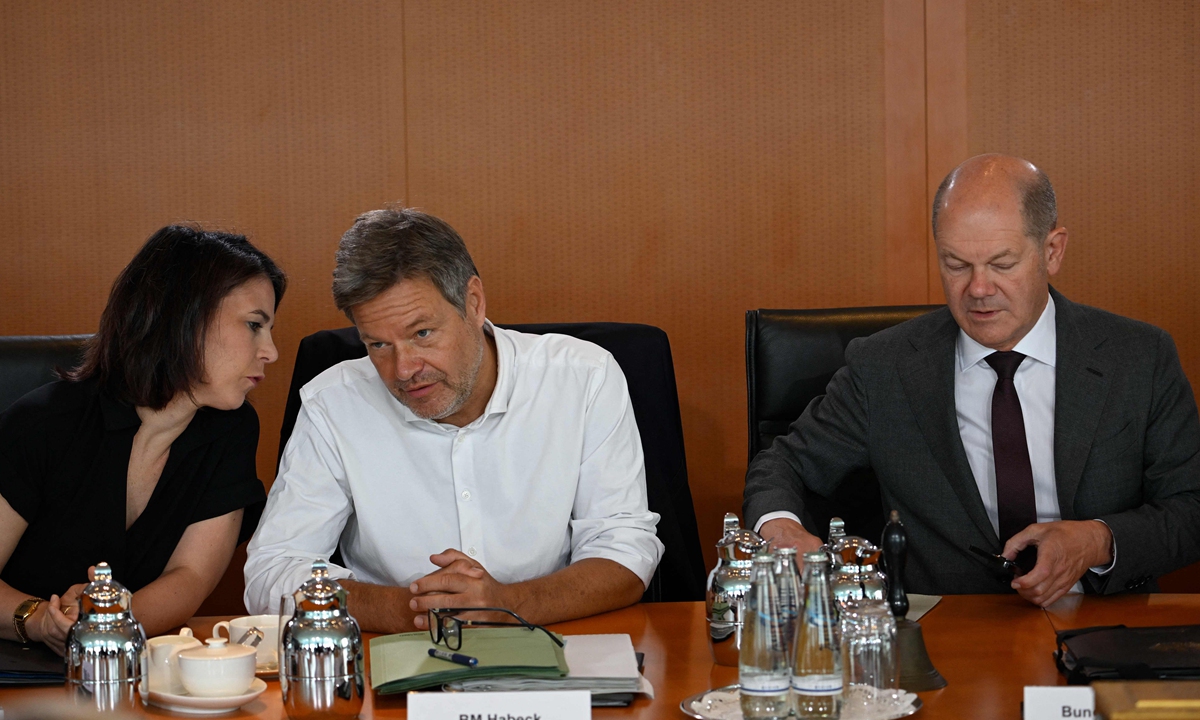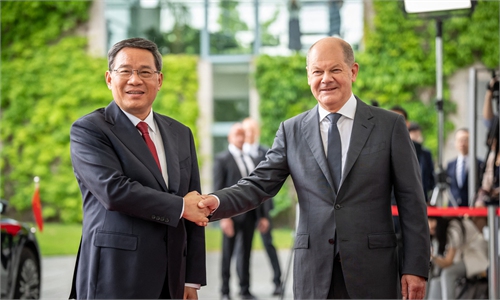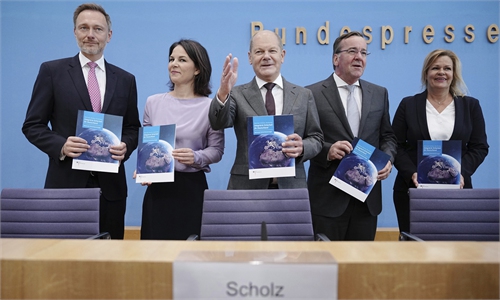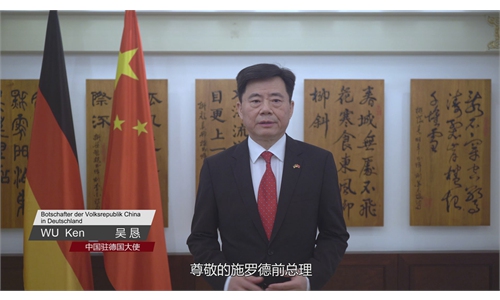Germany's first "China strategy" hurts its own companies more, has limited impact on bilateral ties
‘Bias-based policy only leads to misunderstanding’

Germany's Foreign Minister Annalena Baerbock (left) and German Minister of Economics and Climate Protection Robert Habeck chat next to German Chancellor Olaf Scholz before the start of the weekly meeting of the German cabinet at the Chancellery in Berlin on July 13, 2023. The cabinet published its first and long-awaited China strategy on that day. Photo: VCG
Germany's first China strategy will put its own companies in a bind as it reportedly seeks to pressure them to reduce their dependency on China, and it will have a short-term impact on the just-stabilized China-German ties, Chinese observers warned. Observers predicted this document from China's biggest trade partner in Europe will also have ramifications for Europe's ability to form a unified stance on Beijing.
The German government on Thursday presented a long-awaited strategy for relations with China that points to a "systemic rivalry" with the Asian power and a need to reduce risks of economic dependency, but highlights Berlin's desire to work with Beijing on global challenges such as climate change.
The 64-page document approved by Chancellor Olaf Scholz's cabinet builds on Germany's first national security strategy, issued a month ago, which didn't go into detail on foreign policy. Scholz's three-party coalition had pledged when it took office in late 2021 to draw up a "comprehensive China strategy."
"It is not our intention to impede China's economic progress and development," the document said. "At the same time, de-risking is urgently needed. However, we are not pursuing a decoupling of our economies."
This message echoes that delivered in May by the Group of Seven leading industrial powers, including Germany.
In response to the published German strategy, the Chinese Embassy to Germany said in a statement on Thursday that China hopes Germany can view China's development in a rational, comprehensive and objective manner.
The difficulties and challenges Germany is currently facing are not caused by China. Viewing China as a "competitor and systemic rival" does not accord with reality, nor does it benefit either sides' interests, said the embassy.
The embassy said viewing China and making China policy based on ideological bias will only lead to misunderstanding and misjudgment, and impair cooperation and mutual trust.
The document is Germany's first China strategy as part of an effort to ramp up pressure on German companies to "de-risk" and reduce their dependency on China, experts said.
Chancellor Olaf Scholz's government last year ordered a rethink on how Germany interacts with China. Among the changes under consideration is the screening of investments by German companies doing business in China to protect the flow of sensitive technology and know-how, Reuters reported on Thursday.
The strategy will send out a signal "that we are not naive," German Foreign Minister Annalena Baerbock told reporters Wednesday on the sidelines of the NATO summit in Vilnius.
The document is eagerly awaited, as politicians and businesses across Europe and beyond are keen to see how EU's biggest economy is re-positioning itself regarding China.
The strategy doubled down on "de-risking," which has been repeatedly mentioned by European and US officials, and is also likely to re-position China as a "partner, competitor and systemic rival" as described in Germany's first ever National Security Strategy issued in June this year, Cui Hongjian, director of the Department of European Studies at the China Institute of International Studies, told the Global Times on Thursday.
Cui noted that Germany's talk of "de-risking" with China in fact increases risk factors, especially for its own companies, as the strategy will put German companies in a bind.
German companies have always played the role of pragmatic and significant anchors in helping stabilize bilateral ties, analysts pointed out.
In a meeting with Karl Haeusgen, president of Verband Deutscher Maschinen und Anlagenbau (VMDA), and Christian Klein, CEO of German software and cloud company SAP SE in Beijing on Tuesday, Chinese Commerce Minister Wang Wentao said the idea of "de-risking" should not lead to "decoupling" and "de-Sinicization."
Klein said that "SAP opposes 'decoupling' and other related activities. The company will actively participate in building a more resilient global supply chain, call for the strengthening of international cooperation and formulating unified global data security rules."
The opposition to "decoupling" was also reflected in Germany's new strategy document, because it is impossible for Germany to "decouple" with China, a country it is intertwined deeply with in trade and other areas, Sun Keqin, a research fellow at the China Institutes of Contemporary International Relations, told the Global Times on Thursday.
According to Germany's Federal Statistical Office (Destatis), China remained Germany's most important trading partner for the seventh year in a row in 2022.
Experts predicted that the strategy is likely to strain Germany-China ties in the short term, but they believe the influence will be limited.
The early version, drafted by Germany's Green-led Foreign Ministry, which was leaked last year, hinted at a much tougher stance on China, with measures ranging from import stops to mandatory stress tests for companies regarding "China-specific" risks.
The final version reflects the result of negotiations within the German government, which is divided over the country's China policy: The Green party's Baerbock and Germany's Minister for Economic Affairs and Climate Action Robert Habeck advocate a tougher stance on China while Scholz is considered more pragmatic, said Cui.
Scholz visited China in November 2022, making him the first European leader to do so after the 20th National Congress of the Communist Party of China, and it was his first visit as the German chancellor.
Experts said Germany's first China document will likely have ramifications for the EU's stance on China, at a time when the bloc is struggling to reach a united approach.
"The strategy in part reflects the compromise between China hawks and pragmatists within Germany, but also Atlantists and pragmatists within Europe," said Sun.
European Commission President Ursula von der Leyen had prepared to unveil a road map for "de-risking" economic ties with China. However, diplomats from France, Germany, Italy and the Netherlands were among those expressing concerns about "national security" references made by Bjorn Seibert, von de Leyen's chief of cabinet, in a presentation, media reported.
However, each European countries will still decide, based on their own situation, their ties with China individually, regardless of Germany's "China strategy," instead of following the country blindly, said Cui.



